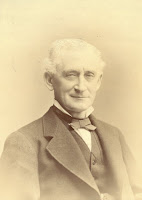This convention was the spark that was ultimately responsible for the creation of the Republican
 Party in New Hampshire. In 1853, Tuck convened a secret meeting of men who were opposed to slavery and suggested that they create a party called the "Republicans." Following on the heels of this successful meeting, Tuck assisted in the formal creation of the state party in 1856. Soon after, he served as a delegate to the Republican National Conventions in 1856 and 1860. Some historians assert that Abraham Lincoln, a personal friend of Tuck, would never have received the presidential nomination if not for his efforts.
Party in New Hampshire. In 1853, Tuck convened a secret meeting of men who were opposed to slavery and suggested that they create a party called the "Republicans." Following on the heels of this successful meeting, Tuck assisted in the formal creation of the state party in 1856. Soon after, he served as a delegate to the Republican National Conventions in 1856 and 1860. Some historians assert that Abraham Lincoln, a personal friend of Tuck, would never have received the presidential nomination if not for his efforts. After leaving politics, Tuck received a naval officer's commission and was stationed in Boston during the Civil War. Here at Rauner, we have the document itself, which was signed by both Abraham Lincoln and Salmon P. Chase. One wonders how much of the war really reached Tuck in Boston, although there were riots in the city in 1863 over the attempt to draft large numbers of Irish immigrants into the Union Army. Regardless, Tuck knew enough of the horrors of war to persuade his son Edward, who graduated from Dartmouth in 1862, to pay a fee to avoid being conscripted. After the war, Amos would go on to make a fortune in the railroad business; Edward would later use railroad stock to found the Amos Tuck School of Administration and Finance at Dartmouth College in honor of his father.
After leaving politics, Tuck received a naval officer's commission and was stationed in Boston during the Civil War. Here at Rauner, we have the document itself, which was signed by both Abraham Lincoln and Salmon P. Chase. One wonders how much of the war really reached Tuck in Boston, although there were riots in the city in 1863 over the attempt to draft large numbers of Irish immigrants into the Union Army. Regardless, Tuck knew enough of the horrors of war to persuade his son Edward, who graduated from Dartmouth in 1862, to pay a fee to avoid being conscripted. After the war, Amos would go on to make a fortune in the railroad business; Edward would later use railroad stock to found the Amos Tuck School of Administration and Finance at Dartmouth College in honor of his father.To learn more about Amos Tuck, come to Rauner and explore the Tuck Family Papers (MS-442) and Amos Tuck 1835's alumni file.

No comments :
Post a Comment